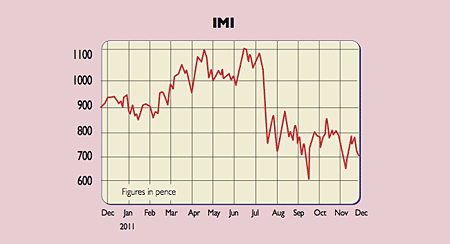Get the latest financial news, insights and expert analysis from our award-winning MoneyWeek team, to help you understand what really matters when it comes to your finances.
You are now subscribed
Your newsletter sign-up was successful
Want to add more newsletters?

Twice daily
MoneyWeek
Get the latest financial news, insights and expert analysis from our award-winning MoneyWeek team, to help you understand what really matters when it comes to your finances.

Four times a week
Look After My Bills
Sign up to our free money-saving newsletter, filled with the latest news and expert advice to help you find the best tips and deals for managing your bills. Start saving today!
Here's something not everyone knows about Birmingham: it lays claim to some of the world's finest engineers. One of them is IMI. Eleven years ago, the firm was written off as a traditional metal basher, selling commoditised widgets and delivering returns below its cost of capital.
Since then, under long-serving chief executive Martin Lamb, it's been transformed into a specialist manufacturer of niche parts. During Lamb's tenure, profit margins have increased from 7.7% to 17%, equity returns have almost trebled to 20% and the shares are up 250%. By any standards, IMI is a class act that Britain can be proud of.
Today, IMI splits itself into two core groups: fluid controls (77% of revenues) and retail dispensing (23%), which together make things such as components for braking/fuel systems, valves for nuclear power stations, controllers for pneumatic doors, and actuators in heating systems and drink dispensers. On 10 November, Lamb reported that trading was on track to hit 2011 targets, despite a slowdown in industrial demand in southern Europe and Britain. Revenue during the first ten months was up by 6%, and the group expects to end December with a "significant reduction" in its net borrowings.
MoneyWeek
Subscribe to MoneyWeek today and get your first six magazine issues absolutely FREE

Sign up to Money Morning
Don't miss the latest investment and personal finances news, market analysis, plus money-saving tips with our free twice-daily newsletter
Don't miss the latest investment and personal finances news, market analysis, plus money-saving tips with our free twice-daily newsletter
The worry for investors is what will happen if there's another recession. However, in 2009 the board did a sterling job of managing costs, with margins only falling 1% from pre-crisis levels. This time Lamb says the company is even better prepared and has a "full array of operational measures" to hand should these be required.
IMI is also proving adept at shifting production to low-cost centres. These should account for 55% of output by the end of 2014 (compared with a percentage in the mid-40s today). There is also nowhere near as much unsold inventory in the industry as there was back in 2008, so the effects of any future destocking should not be as severe.
Looking ahead, the firm's target is to boost margins in the fluid controls division to 20% by improving after-market services, while continuing to beef up its emerging-market presence (19% of sales) and enter related areas, such as clean energy, emissions control and life sciences. Bolt-on acquisitions should also keep the share price rolling. There is even an outside chance that this hunter could become prey. Rumours of bids from giants such as GE, Siemens and Honeywell are regularly aired in the press.
IMI (LSE: IMI), rated a BUY by Jefferies

Analysts are pencilling in 2011 revenues and underlying earnings per share (EPS) of £2.1bn and 78p respectively, nudging up to £2.2bn and 82p in 2012. On this basis, I would rate the stock on an earnings before interest, tax and amortisation (EBITA) multiple of ten. Adjusting for the debt and a £188m pension deficit gives an intrinsic worth of more than £10 a share.
Investors will need to keep an eye on what's happening in the eurozone, as well as on cost pressures and foreign-currency risk. That said, IMI manufactures a vast array of top-notch gadgets and even offers a 3.3% dividend yield. Investment bank Jefferies has a target price of £10.50, and fourth-quarter results are scheduled for 2 March.
Rating: BUY at £7.75
Get the latest financial news, insights and expert analysis from our award-winning MoneyWeek team, to help you understand what really matters when it comes to your finances.
Paul gained a degree in electrical engineering and went on to qualify as a chartered management accountant. He has extensive corporate finance and investment experience and is a member of the Securities Institute.
Over the past 16 years Paul has held top-level financial management and M&A roles for blue-chip companies such as O2, GKN and Unilever. He is now director of his own capital investment and consultancy firm, PMH Capital Limited.
Paul is an expert at analysing companies in new, fast-growing markets, and is an extremely shrewd stock-picker.
-
 New PM Sanae Takaichi has a mandate and a plan to boost Japan's economy
New PM Sanae Takaichi has a mandate and a plan to boost Japan's economyOpinion Markets applauded new prime minister Sanae Takaichi’s victory – and Japan's economy and stockmarket have further to climb, says Merryn Somerset Webb
-
 Plan 2 student loans: a tax on aspiration?
Plan 2 student loans: a tax on aspiration?The Plan 2 student loan system is not only unfair, but introduces perverse incentives that act as a brake on growth and productivity. Change is overdue, says Simon Wilson